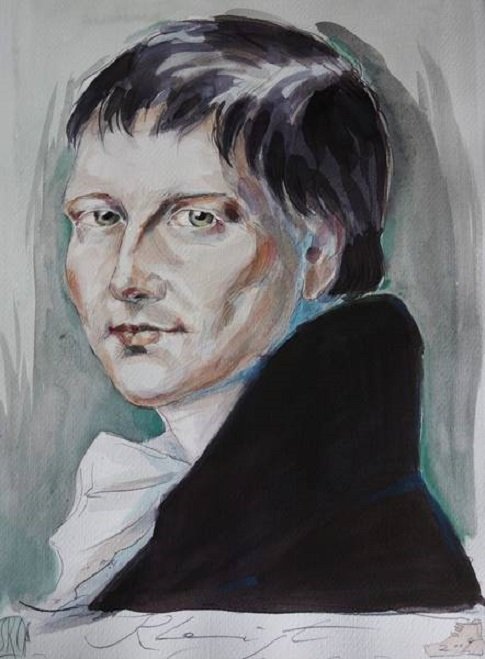Live and creativity of Heinrich Wilhelm von Kleist /part 5/
Every act of Ketchen is therefore beautiful and graceful, and it is the embodiment of the ideal of calokatics, "It is a child created by the will of God" because the reason has not yet succeeded in breaking the integrity of harmony but it is precisely because of this extraordinary essence that she is brought out of the dimension of the ordinary man and acts as a fairy tale as an "angel" ... In all trials, Ketchen manifests the uncondition of his unmistakable feeling, following his unconscious whispers. Only in separate moments - and in a state of sleep - she penetrates her vision in the mysterious programming of her life.
With full consciousness, the secret remains locked in her heart. When Count von Stral inquires why she keeps track of it so responsibly, she replies, "I do not know," but in a deep sleep she finds the secret of her mysterious dedication. Ketchen does not go through a path of inner maturation and self-deception - from the beginning to the end she remains true to her feelings. For her, and for Count von Strahl, even though he matures later on for the truth of his heart, life becomes debilitating when the confidence in love is blurred: "Life without love is death." In Penthesilea, which we can define as a mythological tragedy, innocence and virginity are provoked with incredible destructive power. In Ketchen of Heilbronn, which we could define as a medieval mystery, the dream-inspired idea proves to be confirmed by reality after many misadventures brought about by the fate of the two protagonists. In Kiel's most famous drama "Prince Friedrich von Homburg " a dream is tested by reality. Visited by somnambulistic visions, the young prince knit a laurel wreath on the eve of the battle of Ferbelin.
The next day, in violation of the commander's command, he picked up his regiment and won the victory, but was sentenced to death for disobedience to the orders of the superiors in the army hierarchy. His grave is already dug, and he is covered with panic troubles. Brandenburg's burgers leave him alone to choose the punishment he deserves. The Prince is found guilty and accepts death. After accepting the law and demonstrating that he could dignity in the face of the horror of death, Prince von Hombourg is pardoned, and the drama ends with enthusiastic praise of the Prussian wicked patriotic spirit. In this drama, Kleist manages to combine the duties imposed by the state with the inherent ambitions of the individual. Purified by the heroic test The prince manages to make a synthesis that does not lend itself to the author of the drama in his real life: the hero manages to give the State the enthusiasm, the faith and the excitement that would destroy it if only his personal ambitions were left. In the patriotic drama Prince Friedrich von Humburge, Kleist moves into the circle of Kant's understanding of the law, though his perceptions are partly transferred to another plane. According to Kant, moral action can not be determined by subjective rules, but by objective norms a priori, because subjective principles can make oneself happy and others unhappy. For Kant, moral is what is determined by principles created by the general consciousness of all mankind.

great article
Posted using Partiko iOS
You got a 12.79% upvote from @postpromoter courtesy of @godflesh!
Want to promote your posts too? Check out the Steem Bot Tracker website for more info. If you would like to support the development of @postpromoter and the bot tracker please vote for @yabapmatt for witness!
You have recieved a free upvote from minnowpond, Send 0.1 -> 10 SBD with your post url as the memo to recieve an upvote from up to 100 accounts!